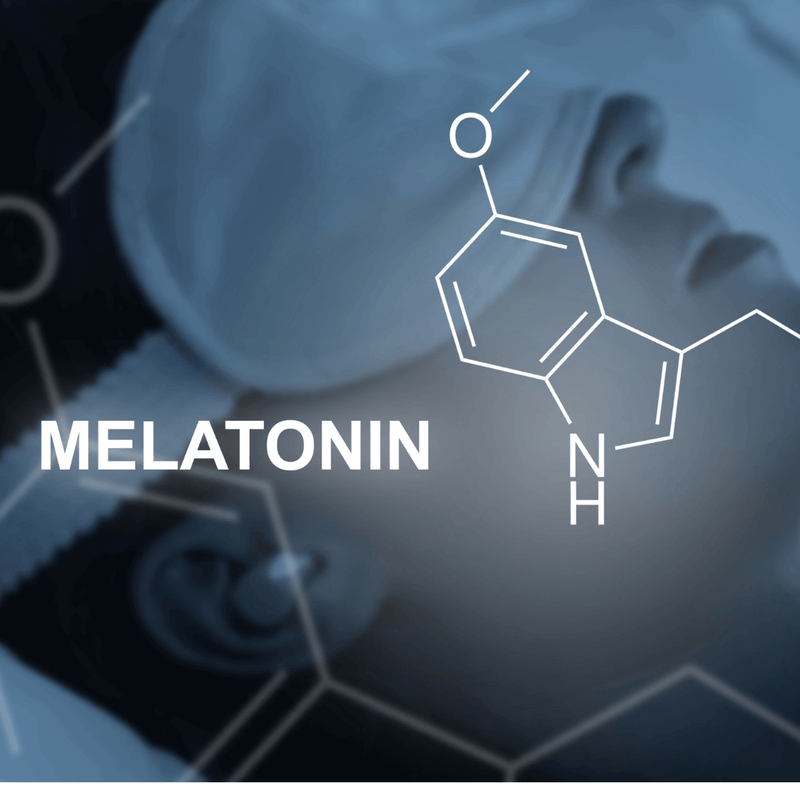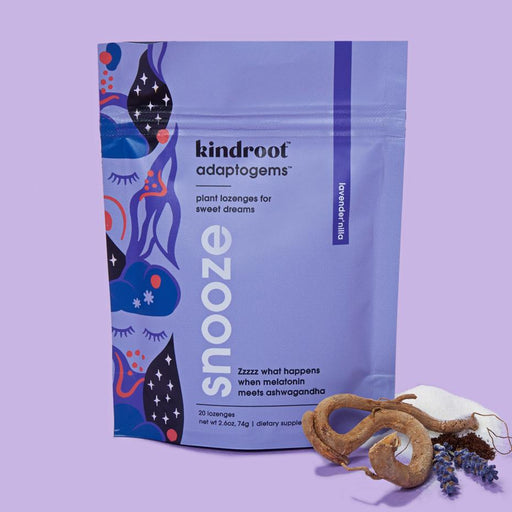Produced by the pineal gland, melatonin is well-known for regulating sleep cycles – but that's not its only function. Melatonin also bolsters immunity, alleviates anxiety and could even make you smarter.
If you're considering taking melatonin supplements for sleep, immunity, anxiety or other reasons, it's a good idea to familiarize yourself with how melatonin works, its potential side effects, and proper dosage to yield the desired benefits. Find everything you need to know in our ultimate guide to melatonin.
Contents
- What is melatonin?
- Health benefits
- Does melatonin work?
- Melatonin studies
- Safety
- Dosage
- Side effects
- Drug interactions
- FAQs
Discover Kindroot Snooze: Melatonin + Ashwagandha Lozenges for Sleep
What is melatonin?
Melatonin is a hormone primarily produced by the pineal gland, though it can also be made in other areas of the body. For example, some immune system cells such as macrophages, mast cells and natural killer (NK) cells can produce melatonin to act as an anti-inflammatory and antioxidant at the site of an injury. In scientific terms, melatonin's chemical structure is C13H16N2O2, which translates to N-Acetyl-5-methoxytryptamine. Melatonin is also found in many foods, such as tart cherries, bananas and pistachios.

For regulating the sleep cycle, darkness triggers melatonin and tells the body it's time to sleep. For this reason, many people take melatonin supplements to help them get to sleep.
Further Reading: The best melatonin supplements, according to doctors
"Melatonin is a hormone produced by the pineal gland in the brain that helps regulate the sleep-wake cycle. It is often called the 'sleep hormone,'” explains Dr. Sony Sherpa, a holistic physician with Nature’s Rise. “When it is dark, the body produces more melatonin, which can make a person feel sleepy. When it is bright, the body produces less melatonin, which can help a person feel more awake. Some people use melatonin supplements to help with sleep problems like insomnia.”
Melatonin health benefits
Melatonin is associated with multiple health benefits, including better sleep, less anxiety, immunity and cognitive function.
Sleep aid
As described, melatonin is most famous for regulating the sleep-wake cycle. Many people take melatonin supplements to help them fall asleep.
Best over-the-counter sleep aids: What doctors say

“Melatonin is commonly used as a sleep aid, especially for people with insomnia,” says Dr. Sherpa. “It helps regulate the sleep-wake cycle and can promote deeper and more restful sleep.”
Free Sleep Tracker: Track your sleep patterns & how they influence your day
Sleep disorders
Melatonin also treats sleep disorders such as REM sleep disorder, delayed sleep-wake disorder and shift work disorder.
Unisom VS. Melatonin: Which is best for sleep?
“Some people’s bodies do not make enough melatonin. In addition, for certain individuals, such as those who work in varying or alternating shifts or who travel across time zones, the body may not release melatonin correctly in response to darkness. In those individuals, melatonin supplementation may improve sleep quality or reestablish normal circadian rhythm function,” says Dr. Kelly Johnson-Arbor, a medical toxicology physician and interim Executive Director at National Capital Poison Center.

Anxiety
Melatonin can also help alleviate anxiety – and studies have shown melatonin to be as effective as anti-anxiety medicines. It’s commonly recommended as an anti-anxiety supplement before and after surgery.

“A few studies have investigated the use of melatonin in patients undergoing surgery as a treatment to reduce pre- or post-operative anxiety, and some research suggests that melatonin may reduce preoperative anxiety in adults,” says Dr. Johnson-Arbor.
In-Depth: Does melatonin help with anxiety? See what doctors say
Immunity
Melatonin plays a significant role in our immune system, bolstering both innate and adaptive immunity. Melatonin is an immunostimulant that triggers the body to respond to infections and injuries and helps the body remember pathogens to build immunity to specific diseases.

Moreover, melatonin is an antioxidant that scavenges free radicals and can act as an anti-inflammatory that supports cells that attack pathogens.
Read: How melatonin boosts immunity, according to experts
Cognitive function
Though more research is needed, studies suggest that melatonin promotes memory function, prevents memory loss and protects the brain. Moreover, melatonin promotes better sleep, which improves cognitive function and overall intelligence.
Take a Deeper Dive: Does melatonin make you smarter? Here's what doctors say

Jet lag
Melatonin is also frequently used to combat the effects of jet lag, especially when flying across multiple time zones. Since melatonin triggers the beginning of the sleep cycle, you can use melatonin to induce sleep earlier when traveling east and help you sleep later when traveling west. Learn more about how melatonin treats jet lag.

Other melatonin benefits
Melatonin has also been reported to:
- Relieve acid reflux/GERD
- Promote eye health
- Alleviate tinnitus
- Relieve symptoms of Seasonal Affective Disorder (SAD)
- Receive symptoms of Alcohol Use Disorder (AUD)
- Offer benefits for endometriosis, high blood pressure, migraines, cancer, TMJ, thrombocytopenia and even sunburns (with topical application)
“Melatonin is believed to help improve sleep quality, reduce sleep offset and fight jet lag, as this supplement influences one’s circadian rhythm,” says Dr. Po-Change Hsu, MD and Medical Content Expert at Sleeping Ocean. “Other potential benefits like relieving acid reflux or improving immunity and eye health require further investigation. Melatonin also boosts the immune system. There is conflicting evidence on whether melatonin helps with cognitive functions.”

Kindroot Snooze: Lozenges for Sweet Dreams
Does melatonin work?
Naturally-produced melatonin works, but sometimes it needs help, especially if your melatonin levels are low. Many people turn to melatonin supplements that come in many forms and formulations, from pills and gummies to liquid drops, chocolates and lozenges.
“Melatonin works for most people, but some patients note they don’t notice any effects. That might depend on their lifestyle, sleep habits, insomnia severity and individual tolerance toward synthetic melatonin,” says Dr. Hsu.
Generally, melatonin supplements work – but getting them from a reputable company that uses quality ingredients with accurate dosages is essential.

“Melatonin is effective for certain uses, helping people with insomnia fall asleep faster and improving sleep quality. In addition, studies have shown that melatonin can effectively reduce the time it takes to fall asleep, increase the total amount of sleep time, and improve overall sleep quality,” says Dr. Sherpa. “However, the effectiveness of melatonin can vary among individuals and may depend on several factors, such as the dose, timing, and individual factors such as age and underlying health conditions. Therefore, it’s important to note that more research is needed to fully understand the effects of melatonin, and the optimal dose and timing for various uses may vary.”
Melatonin studies
Reference these studies to explore melatonin’s efficacy in-depth:
- Melatonin’s neuroprotective role in mitochondria and its potential as a biomarker in aging, cognition and psychiatric disorders
- Melatonin prevents sleep deprivation-associated anxiety-like behavior
- Neuroprotective effects of melatonin administration against chronic stress
- Melatonin in perioperative medicine: Current perspective
- Comparison of effects of oral melatonin with oral alprazolam
- Comparison of the effects of melatonin and oxazepam on anxiety levels and sleep quality
- Melatonin, immune function and aging
- Melatonin: Buffering the immune system
- Significance of melatonin in antioxidative defense system
- Melatonin and its relation to the immune system and inflammation
- Melatonin may improve COVID vaccine efficacy and duration
Is melatonin safe?
Yes, melatonin is safe for adults when you follow recommended dosages and get melatonin supplements from reputable brands with quality control processes, premium ingredients and dosage consistency. Melatonin is also generally regarded as safe for babies, children and teens, but always be sure to speak with your doctor before giving melatonin to minors.
That said, there are potential interactions, and certain people shouldn’t take melatonin. See below for more information.

“Melatonin is generally considered safe when used as directed. It has been widely used as a sleep aid and has a relatively low risk of side effects,” says Dr. Sherpa. “However, like all substances, melatonin can cause adverse effects in some people, especially when taken in large doses or for extended periods. Taking high doses of melatonin can disrupt the natural production of the hormone in the body and lead to hormonal imbalances. For this reason, it’s important to use melatonin as directed and not exceed the recommended dose.”
It's also critical to get melatonin from quality sources, especially since it’s considered a dietary supplement – not a medicine – so it isn’t as strictly regulated.
“Melatonin is a dietary supplement in the United States. That means that there is no standardized or FDA-approved dosing of melatonin, and melatonin products are not heavily regulated by the FDA and may contain unwanted contaminants such as heavy metals or pesticides,” says Dr. Johnson-Arbor.
Melatonin dosage
Melatonin dosages depend on various factors, including your reason for taking melatonin, age and weight. Here are some general guidelines, but always consult with a doctor to identify the best dose for your needs.
- For sleep: 2 to 3mg, 1 to 3 hours before you want to sleep
- For anxiety: 2 to 3mg, 1 to 3 hours before you want to sleep
- For jet lag: 2 to 3mg, 2 to 3 hours before you want to sleep
- For cognitive function: .3 to 1mg, increase if it doesn’t lead to sleep

Melatonin side effects
Though melatonin is safe, it could have the following potential side effects – especially if you don’t follow recommendations (though only a small percentage of people experience these side effects).
- Headache
- Dizziness
- Nausea, cramps and diarrhea
- Drowsiness (including daytime sleepiness)
In addition, certain people should avoid taking melatonin, such as women who are pregnant or breastfeeding.

“Pregnant or breastfeeding women and people with autoimmune disorders or seizures should avoid taking melatonin,” says Dr. Hsu. “Diabetes and hypertension patients should be cautious, too. Melatonin might also interact with blood thinners, so it’s always a good idea to talk to one’s doctor before taking this supplement.”
Melatonin drug interactions
If you’re taking other medications or supplements, always consult a physician or pharmacist before taking melatonin.
“People who take other sedating medications, including prescription medications like opioid analgesics or benzodiazepines, over-the-counter products like Benadryl or NyQuil, or alcohol, should avoid taking melatonin due to the risk of excessive drowsiness,” says Dr. Johnson Arbor.

Drugs.com, a site that checks potential drug interactions, lists 289 melatonin interactions. Of those, 282 are considered “moderate” interactions, and seven are considered “minor.” None are listed as “major.”
Potential melatonin interactions include:
- Opioid analgesics
- Benzodiazepines
- Alcohol
- Sedatives
- Blood thinners
- Blood pressure meds
- Anticonvulsants
- Antidepressants
- Oral contraceptives
- Diabetes medications
- Immunosuppressants
- Anticoagulants and anti-platelet drugs, herbs, and supplements
- Central nervous system depressants
- Cytochrome (e.g. diazepam – Valium)
- Fluvoxamine (Luvox)
- Seizure threshold lowering drugs (could increase risk of seizures)
Can you take melatonin with…?
These are general guidelines based on available interaction data from Drugs.com Drug Interactions Checker and not an exhaustive list. Always consult a physician or pharmacist to inquire about potential interactions between melatonin and other supplements or drugs you take.
|
Drug/Supplement |
Melatonin Interactions |
|
May increase side effects. Note that different Benadryl formulations may have other interactions |
|
|
No reported interactions |
|
|
May increase side effects |
|
|
May increase side effects |
|
|
May increase side effects. Note that different NyQuil formulations may have other interactions |
|
|
May increase side effects |
|
|
No reported interactions |
|
|
May increase side effects |
|
|
May increase side effects |
|
|
May increase side effects |
|
|
May increase side effects |
|
|
No reported interactions |
|
|
Minor interaction. Oral caffeine may increase bioavailability of melatonin |
|
|
No reported interactions |
|
|
May increase side effects |
|
|
May increase side effects |
|
|
No reported interactions |
|
|
May increase side effects. Note that different Tylenol formulations may have other interactions |
|
|
May increase side effects |
|
|
May increase side effects |
|
|
No reported interactions |
|
|
May increase side effects |
Melatonin FAQs
Answers to frequently asked questions about melatonin.
Melatonin supplements for sleep
Does melatonin help you sleep?
Yes, melatonin helps regulate the circadian rhythm. When you take melatonin, it triggers the sleep cycle to help you fall asleep.
Does melatonin help you stay asleep?
Higher melatonin levels keep you sleepy, so melatonin supplements can help you stay asleep. Sometimes, melatonin is paired with other ingredients, such as ashwagandha, which has a calming effect that promotes more restful sleep.
How long does melatonin take to work?
Melatonin typically starts working in 30 to 60 minutes, with the full effect kicking in between 1 and 3 hours after taking it.
How long does melatonin last? What is melatonin’s half-life?
Melatonin’s half-life – the amount of time it takes for your body to eliminate half of an element – ranges from one to two hours. It lasts anywhere from 4 to 10 hours, depending on how much you take, the formulation and your metabolism, among other factors.
Can you take melatonin every night?
Melatonin is generally considered safe to take every night. However, if you need to take it nightly for sleep for two or more months, you should see your doctor to see if there is a treatable, underlying cause for your insomnia.
Luden's Melatonin Soothers discontinued: Here’s an alternative
Can you take melatonin twice in one night?
While it’s probably technically safe to take melatonin twice in one night – especially if you stick to recommended dosages – it’s not advised because its effects could linger the following morning and cause excessive drowsiness when driving, at work or operating machinery.
How long before bed should you take melatonin?
Take melatonin 1 to 3 hours before bed.
Does melatonin cause weird dreams or nightmares?
Melatonin may influence vivid or even weird dreams, though studies suggest that melatonin-induced nightmares are exceedingly rare. Learn more.
Does melatonin make it hard to wake up or make you groggy?
Like other supplements, melatonin affects everyone differently. In general, taking the recommended dose of melatonin should help you wake up feeling refreshed. However, if you take too much or metabolize melatonin slowly, it’s possible the effects could linger the next day. Start with low doses to evaluate how melatonin affects you, then go from there. Most people only need 3mg to get the desired effect.
Read: Does melatonin cause nightmares and dreams?
Is melatonin FDA approved?
Melatonin is considered a dietary supplement, not a drug, and therefore isn’t regulated by the FDA. That means there is no mechanism by which melatonin can earn FDA approval.
10 L-theanine benefits, according to science
What are the best melatonin supplements?
The best melatonin supplements are made by reputable brands using quality ingredients, consistently accurate dosages, and incorporating quality control processes. Beyond that, it comes down to personal preference for delivery type (lozenge, gummy, pill, etc.) and flavors. Learn more about different types of melatonin supplements.

Kindroot Snooze: Melatonin Lozenges Made with Natural Ingredients
Melatonin for other indications
Is melatonin an antioxidant?
Yes, melatonin is an antioxidant capable of scavenging as many as ten free radicals. Learn more.
Is melatonin an anti-inflammatory?
Melatonin is an immunological buffer because it has pro-inflammatory and anti-inflammatory properties. Learn more.
Can melatonin help your immune system?
Yes, melatonin plays an integral role in immunity and immune system health. Learn more about how melatonin boosts immunity.
Can melatonin make you smarter?
Despite conflicting evidence, multiple studies indicate that melatonin can improve cognitive function. Learn more about how melatonin could make you smarter.
Can you take melatonin for jet lag?
Yes, melatonin is commonly indicated for jet lag. Learn more about how to use melatonin for jet lag.
Can melatonin help with sundowning?
Research suggests that low-dose melatonin could help with sundowning, also known as late-day confusion.
Can you take melatonin during the day or in the morning?
Unless you’re going to be at home and not operating machinery, taking melatonin during the day or in the morning is generally not recommended. However, you may take it before surgery at any time of day.
Read: How to use melatonin for jet lag: What sleep coaches say
Can melatonin ease anxiety before surgery?
Studies have shown that melatonin can be as effective as anti-anxiety medications at relieving anxiety before and after surgery. Learn more.
Is melatonin indicated for acid reflux and GERD?
Some studies suggest that melatonin could alleviate acid reflux and GERD symptoms, but more research is needed to confirm.
Can melatonin cause hair loss or hair growth?
Some studies have shown that melatonin could slow hair loss or even stimulate hair growth, while others suggest that too much melatonin could lead to hair loss.
Can melatonin help with cancer?
Melatonin suppresses tumor promotion and inhibits cancer growth. Experimental studies have suggested that melatonin could slow breast, ovarian, prostate, oral, gastric and colorectal cancers. More research is needed to fully understand how melatonin could treat certain types of cancer.
20 reishi mushroom benefits, backed by science
Can melatonin cause or help with dementia and Alzheimer’s?
Some research suggests that high levels of melatonin paired with prolonged use could increase the risk of dementia, while others suggest that melatonin could prevent neuron damage associated with dementia. More research is needed.
Can melatonin help with stress?
Studies have shown that melatonin could help reduce chronic stress. Learn more.
Does melatonin lower blood pressure?
Some studies have shown that daily nighttime melatonin reduces blood pressure, while others have suggested it could increase blood pressure in patients who use hypertension drugs. More research is needed. If you’re on blood pressure medication, consult your doctor before taking melatonin.
Is melatonin a blood thinner?
Melatonin may act as a blood thinner when taken in high doses.
Is melatonin an effective hangover cure?
Melatonin can help you sleep, one of the best ways to curb a hangover, but it’s not generally recommended as a cure.
Can melatonin affect sex drive or help with erectile dysfunction (ED)?
Some studies have shown that melatonin can improve sexual function in mammals, while others have shown that it may help with erectile dysfunction.
Can melatonin get you high?
Though anecdotal stories are found on Internet forums, most sources say you cannot get high or “trip” on melatonin.
Can dogs and cats have melatonin?
Melatonin has been indicated for dogs and cats, but consult your veterinarian first.
Safety
Is melatonin safe for long-term use?
Most studies on the benefits of melatonin deal with short-term use, usually up to two months. If you need to use melatonin longer than that, consult your doctor to see if you have an underlying condition that warrants a different treatment.
Can you take melatonin with alcohol or take melatonin after drinking?
It’s not recommended to take melatonin with alcohol or after drinking, as alcohol could enhance melatonin’s effects and cause dangerous conditions such as excessive sleepiness.
Can you become dependent on or addicted to melatonin?
No, melatonin isn’t addictive. Unlike many sleep aids, you’re unlikely to develop a dependency on melatonin.
Can you get melatonin withdrawal symptoms?
Since melatonin isn’t addictive, you can’t get melatonin withdrawal symptoms.
Can you overdose on melatonin?
While it’s technically possible to overdose on melatonin, it’s not likely – and virtually impossible if you stick to recommended doses. However, melatonin overdoses are a concern among children, especially those who might mistake melatonin gummies and chocolates for candy. Between 2012 and 2021, 260,435 pediatric ingestions were reported to the National Poison Data System. Of those, five children required mechanical ventilation, and two died.
Can you take melatonin while pregnant?
The general consensus is that there isn’t enough evidence to say whether taking melatonin during pregnancy is safe. Some studies suggest that melatonin could decrease the risk of pre-eclampsia or preterm birth, but you should always consult your physician.
Can you take melatonin while nursing/breastfeeding? Does melatonin end up in breast milk?
Studies have shown that some mothers have safely taken melatonin while breastfeeding, but it’s not recommended. Breast milk naturally contains some melatonin, but supplementation could increase those levels. Again, speak with your doctor.
Does melatonin expire? Is expired melatonin safe?
Yes, melatonin supplements have expiration dates, and it is not recommended to take expired melatonin.
Does melatonin affect birth control?
So far, no reliable evidence suggests melatonin affects birth control – though taking them together could make melatonin more potent.
Does melatonin make you gain weight?
No. Studies have found that melatonin supplementation may help you lose weight. Moreover, getting a good night’s sleep contributes to a healthy weight.
Do you need prescription melatonin, or can you get it over the counter?
You can buy melatonin over the counter in the United States. It’s only available as a prescription in some countries, such as the U.K., Australia, Germany, Denmark and Japan.
Can melatonin cause constipation or diarrhea?
Like many other supplements, constipation and diarrhea are listed as potential side effects of taking melatonin – though they’re rare. In fact, gastroenterologists believe melatonin may support digestive health and even recommend it as a treatment for disorders such as chronic idiopathic constipation and irritable bowel syndrome.
Can melatonin cause headaches?
Headaches are likewise a potential side effect, but it’s worth noting that melatonin is also used to treat headaches and even migraines.
Can melatonin cause seizures?
There is conflicting evidence, which might depend on the specific situation. For example, taking melatonin with seizure threshold-lowering drugs might increase seizure risk. However, one review found no marked overall effect on seizures when taking melatonin. At the same time, some research suggests that melatonin could help prevent epileptic seizures, while low melatonin levels may be associated with intractable epilepsy.
In-Depth: Melatonin Deficiency: Symptoms, Causes & Treatment Options
Can people with diabetes take melatonin?
Melatonin is generally considered safe for diabetics, though people with diabetes likely want to avoid melatonin gummies, chocolates and other products that are high in sugar. Some studies have found a link between melatonin and insulin secretion, which plays a role in Type 2 diabetes, and suggested that melatonin’s antioxidant properties could protect the pancreas against oxidative stress. Ultimately, more research is needed to determine whether melatonin affects diabetes.
Can you take melatonin if you have sleep apnea?
Most articles state that you shouldn’t take melatonin if you have sleep apnea. They usually say that taking a supplement that helps you sleep is dangerous when you have a condition that causes you to stop breathing while you sleep. However, some studies have shown that melatonin may improve sleep consolidation in untreated obstructive sleep apnea patients. If you have sleep apnea, consult your doctor before taking melatonin or any other sleep aid.
Can you take melatonin with a concussion?
Though studies suggest that melatonin could be an effective way to improve sleep quality after traumatic brain injury, always consult your doctor for treatment if you’ve had a concussion. Never self-treat.
Can you be allergic to melatonin?
Some people may be allergic to melatonin. Seek emergency treatment if you experience signs of an allergic reaction.
General FAQs
What are the symptoms of melatonin deficiency/low melatonin?
Melatonin deficiency symptoms include insomnia, nighttime waking, daytime drowsiness, fatigue, weight gain, confusion, anxiety and mood disorders. Learn more about melatonin deficiency and what to do if you have low melatonin.
How can you test melatonin levels?
You can measure melatonin levels with blood, urine and saliva tests at your doctor’s office, a medical lab or with at-home testing kits, though home testing might not be the best option. Learn more.
Where can you get natural melatonin? Which foods are melatonin rich?
Foods high in melatonin include tart cherries, eggs, milk, fish, nuts, rice, goji berries, oats, mushrooms, bananas, corn, tomatoes, peppers, black and white mustard seeds, pistachios, grapes, strawberries and coffee.
Is melatonin a vitamin?
Melatonin is a hormone, not a vitamin, because it’s produced by the body and is not a micronutrient that needs to be included in your diet. In the U.S., melatonin is considered a dietary supplement.
Is melatonin organic?
Melatonin made in the body is organic, though most melatonin supplements are made from synthetic melatonin.
Is melatonin vegan?
Synthetic melatonin, commonly used in supplements, is usually suitable for vegan and vegetarian diets because it’s not extracted from animals. However, it’s important to check labels for other ingredients. Some melatonin supplements are vegan; others are not.
Disclaimer: The information stated in this article is for educational purposes only. The information stated is not intended to treat, diagnose or cure any disease, condition, or other physical or mental ailment of the human body. The desire to make any changes to one's dietary habits or supplementation should be consulted and discussed with a licensed medical professional.




